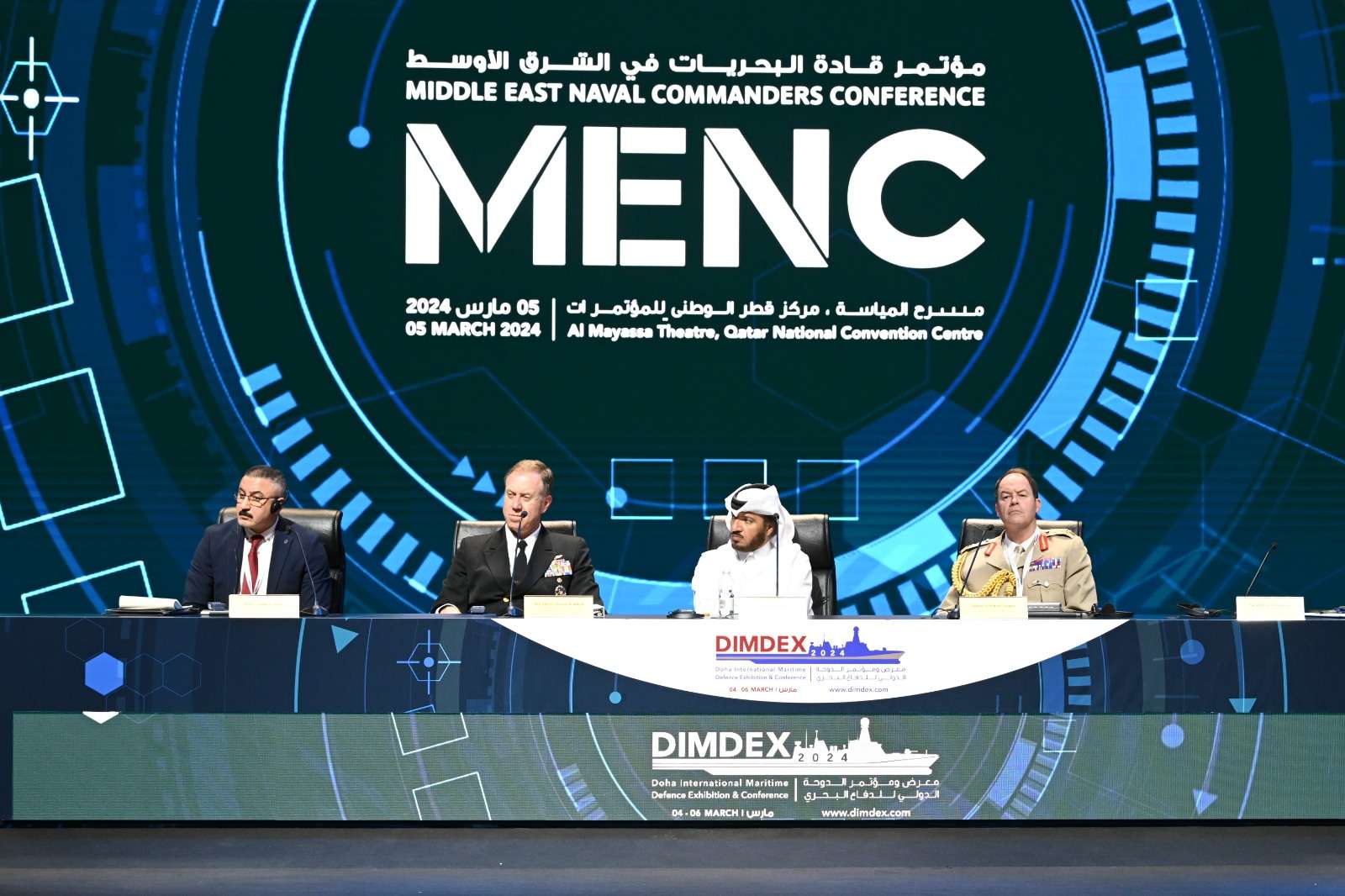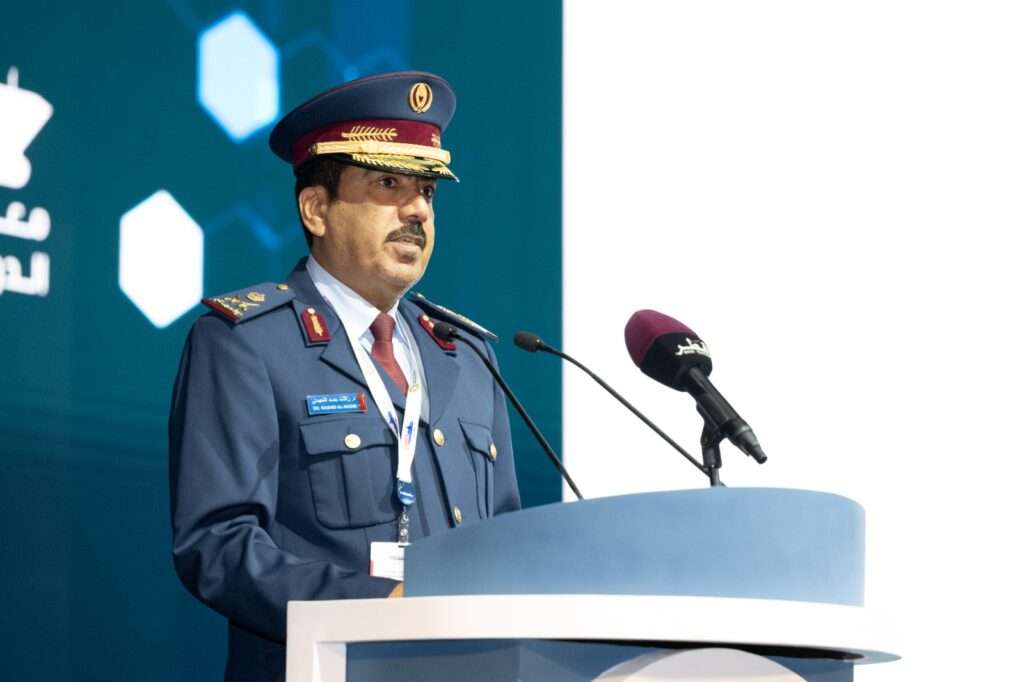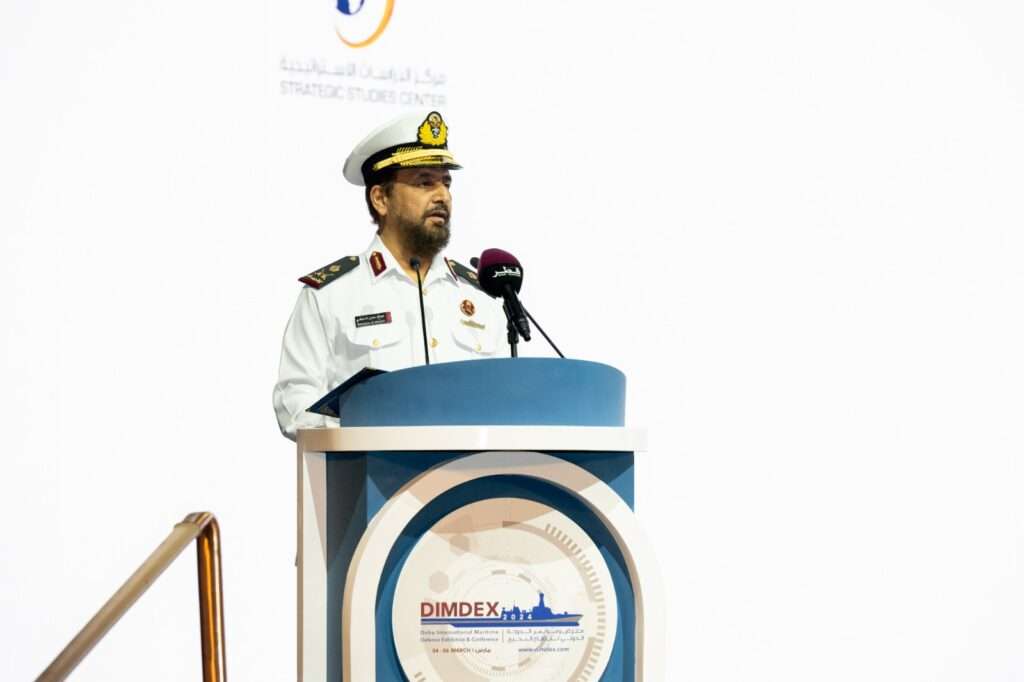
Doha, Qatar, 5 March 2024: The second day of the eighth edition of the Doha International Maritime Defence Exhibition & Conference (DIMDEX 2024) featured the Middle East Naval Commanders Conference (MENC) hosted in partnership with the Strategic Studies Centre of the Qatar Armed Forces under the theme “Economic Growth Prospects Amidst Security Challenges and Their Global Impact”.
The conference is held as part of DIMDEX 2024 activities under the esteemed patronage of HH Sheikh Tamim Bin Hamad Al-Thani, Amir of the State of Qatar, and hosted and organised by the Qatar Armed Forces. This year, the DIMDEX 2024 theme is “Igniting the Future of Maritime Security and Beyond.”
Held at Al Mayassa Theatre in the Qatar National Convention Centre, the conference was attended by Major General (Navy) Abdullah bin Hassan Al-Sulaiti, Commander of the Qatar Amiri Naval Forces as well delegations, ministers, ambassadors, naval leaders, experts, naval specialists and academics.
This year’s conference focused on one of the most pressing international matters: waterway security, the safety of global transportation networks, and their implications for the economy and global growth, as well as the importance of geostrategic relations, interconnectedness, and interdependence in dealing with these challenges.
Staff Major General (Doctor / Air) Rashid Hamad Al-Nuaimi, Commander of the Strategic Studies Centre of the Qatar Armed Forces said: “We are honoured to organise the Middle East Naval Commanders Conference which brings together military leaders, academics and experts to discuss the challenges facing maritime security and their impact on global economies and the strategies needed to overcome them. By leveraging the expertise and knowledge of these military leaders, academics and experts, the conference aims to delve into various critical topics that touch on the maritime security domain, the security of sea crossings and the important role technology and artificial intelligence can play in achieving and enhancing maritime security as a whole.”
Major General (Navy) Abdullah bin Hassan Al-Sulaiti, Commander of the Qatar Amiri Naval Forces, said: “Today, maritime security has become a critical matter, as the seas and oceans represent the most important routes for the movement of global trade between countries with the maritime sector contributing significantly to the global economy. The conference will address the economic, regional, and global implications of maritime challenges, as well as delve deeply into the perspectives and extensive knowledge of experts and professionals, benefiting from their industry related and practical experiences in dealing with these challenges, and offering potential strategies that can contribute to setting a solutions framework.”
The conference’s theme comes in line with the current challenges facing maritime trade routes, which account for over 90% of global trade, leading to disruptions in the global economy.


Two sessions featuring high-level speakers
The conference was divided into two sessions, with high-level speakers providing in-depth insights into the best practices to deal with current maritime challenges. The first session was moderated by Professor Osama Kubbar, a senior expert and policy analyst at the Strategic Studies Centre of the Qatar Armed Forces, and a specialist in the fields of advanced technology, cybersecurity, national security and alliances/international relations.
Vice Admiral George M. Wikoff, Commander of the United States Naval Forces, Central Command/Commander of the Fifth Fleet, and Commander of the Combined Maritime Forces, launched the session by emphasising the importance of keeping international waters open to all legitimate maritime traffic and the freedom of navigation, as well as the significance of joint efforts between the US Navy and allied partners to contribute to the protection of regional waters in light of the current challenges.
General Sir Patrick Sanders, Chief of the General Staff, UK, outlined the British Army’s strategic vision emphasising the goal of building one of the most modern and world class armies and that Qatar emerges as a critical strategic partner within the framework of this vision.
This session also included an insightful talk by Dr. Khalid Shames, Assistant Professor in Finance and Economics at Qatar University who touched on the impact of international maritime cable crisis on the global economy and the importance of adopting economic, political and military solutions to bring stability back to the regional waters. General Claudio Graziano, Former Chief of Army, Chief of Defence staff (Italy) and Chairman of EU Military Committee concluded the discussion by addressing new trends and industry challenges in the Middle East that touch all maritime dimensions.
The second session was moderated by Prof. Omar Ashour Professor of Security and Military Studies, founder of the Critical Security Studies Program at the Doha Institute for Graduate Studies, and Head of the Strategic Studies Unit at the Arab Centre for Research and Policy Studies.
The session featured Cdre Mark Anderson CBE RN, Commander of the Most Excellent Order of the British Empire (CBE), who touched on an integrated vision for maritime security. Professor Merve Seren, Assistant Professor at Ankara Yildirim Bayazıt University, addressed the role of advanced technology in the security and defence industry, while Marine Major General Emmanuel Salers, Commander of Indian Ocean Naval Regional and Commander of the French forces stationed in the United Arab Emirates, spoke on the safety of maritime navigation and the preservation of submarine cables and continental shelf. For his part, Dr. Mohamed Al Duranni, Assistant Professor of Cybersecurity at the Qatar Community College, addressed the advantages and disadvantages of artificial intelligence.

Leave a Reply